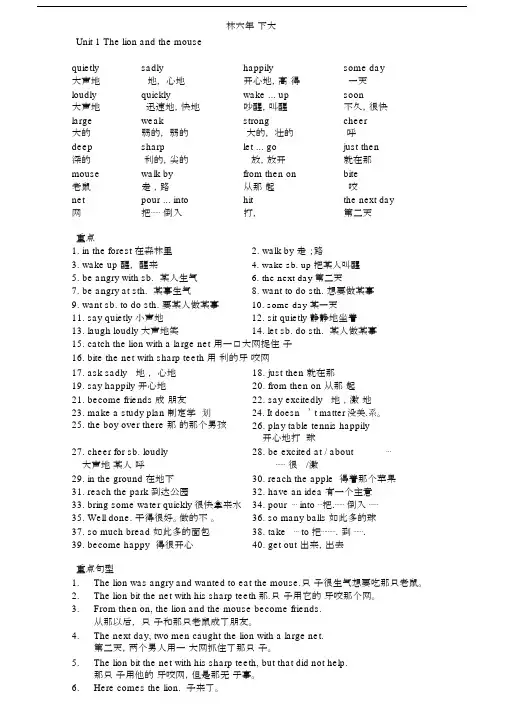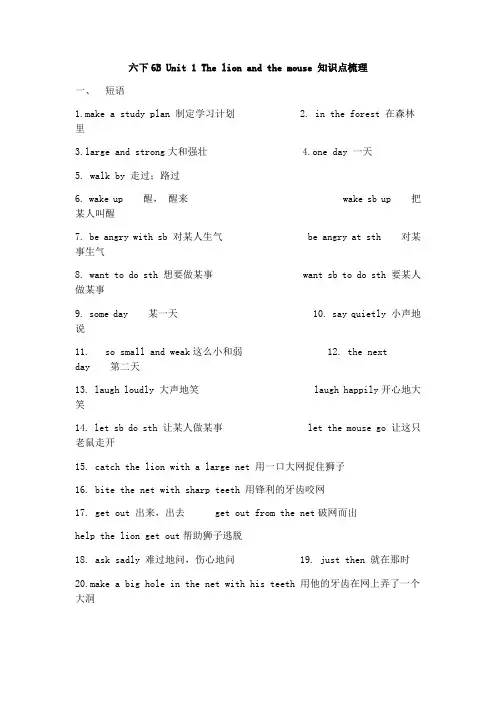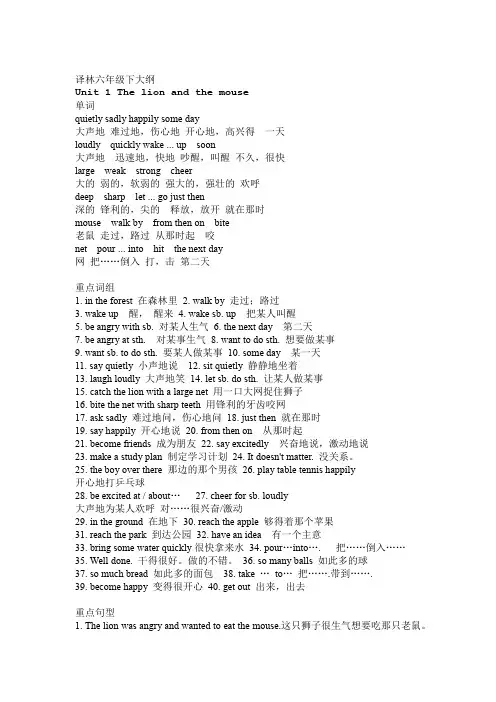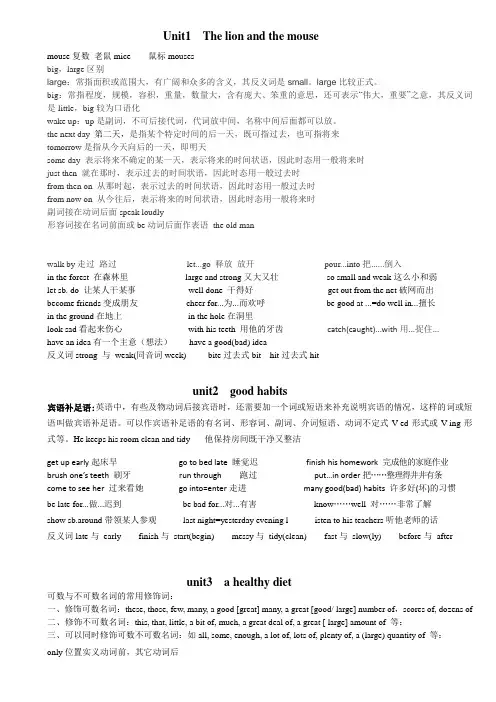小学牛津英语译林版6B英语知识点
(完整版)译林英语6B知识点归纳,推荐文档.docx

林六年下大Unit 1 The lion and the mousequietly sadly happily some day大声地地,心地开心地,高得一天loudly quickly wake ... up soon大声地迅速地,快地吵醒,叫醒不久,很快large weak strong cheer大的弱的,弱的大的,壮的呼deep sharp let ... go just then深的利的,尖的放,放开就在那mouse walk by from then on bite老鼠走,路从那起咬net pour ... into hit the next day网把⋯⋯倒入打,第二天重点1. in the forest 在森林里2. walk by 走;路3. wake up 醒,醒来4. wake sb. up 把某人叫醒5. be angry with sb. 某人生气6. the next day 第二天7. be angry at sth. 某事生气8. want to do sth. 想要做某事9. want sb. to do sth. 要某人做某事10. some day 某一天11. say quietly 小声地12. sit quietly 静静地坐着13. laugh loudly 大声地笑14. let sb. do sth. 某人做某事15.catch the lion with a large net 用一口大网捉住子16.bite the net with sharp teeth 用利的牙咬网17. ask sadly 地,心地18. just then 就在那19. say happily 开心地20. from then on 从那起21. become friends 成朋友22. say excitedly 地,激地23. make a study plan 制定学划24. It doesn ’ t matter没关.系。
译林牛津英语6B知识点

六下6B Unit 1 The lion and the mouse 知识点梳理一、短语1.make a study plan 制定学习计划2. in the forest 在森林里rge and strong大和强壮4.one day 一天5. walk by 走过;路过6. wake up 醒,醒来 wake sb up 把某人叫醒7. be angry with sb 对某人生气 be angry at sth 对某事生气8. want to do sth 想要做某事 want sb to do sth 要某人做某事9. some day 某一天 10. say quietly 小声地说11. so small and weak这么小和弱 12. the nextday 第二天13. laugh loudly 大声地笑 laugh happily开心地大笑14. let sb do sth 让某人做某事 let the mouse go 让这只老鼠走开15. catch the lion with a large net 用一口大网捉住狮子16. bite the net with sharp teeth 用锋利的牙齿咬网17. get out 出来,出去 get out from the net破网而出help the lion get out帮助狮子逃脱18. ask sadly 难过地问,伤心地问 19. just then 就在那时20.make a big hole in the net with his teeth 用他的牙齿在网上弄了一个大洞21. say happily 开心地说, 22. from then on 从那时起23. become friends 成为朋友 become good friends成为好友24.a happy boy 一个快乐地男孩 25. say excitedly 兴奋地说,激动地说26.sweet shop甜品店 27. the boy over there 那边的那个男孩28. It doesn’t matter. 没关系。
完整word版译林英语6B知识点归纳

译林六年级下大纲Unit 1 The lion and the mouse单词quietly sadly happily some day大声地难过地,伤心地开心地,高兴得一天loudly quickly wake ... up soon大声地迅速地,快地吵醒,叫醒不久,很快large weak strong cheer大的弱的,软弱的强大的,强壮的欢呼deep sharp let ... go just then深的锋利的,尖的释放,放开就在那时mouse walk by from then on bite老鼠走过,路过从那时起咬net pour ... into hit the next day网把……倒入打,击第二天重点词组1. in the forest 在森林里2. walk by 走过;路过3. wake up 醒,醒来4. wake sb. up 把某人叫醒5. be angry with sb. 对某人生气6. the next day 第二天7. be angry at sth. 对某事生气8. want to do sth. 想要做某事9. want sb. to do sth. 要某人做某事10. some day 某一天11. say quietly 小声地说12. sit quietly 静静地坐着13. laugh loudly 大声地笑14. let sb. do sth. 让某人做某事15. catch the lion with a large net 用一口大网捉住狮子16. bite the net with sharp teeth 用锋利的牙齿咬网17. ask sadly 难过地问,伤心地问18. just then 就在那时19. say happily 开心地说20. from then on 从那时起21. become friends 成为朋友22. say excitedly 兴奋地说,激动地说23. make a study plan 制定学习计划24. It doesn't matter. 没关系。
(完整word版)小学牛津英语译林版6B英语知识点

Unit1 The lion and the mousemouse复数老鼠mice 鼠标mousesbig,large区别large:常指面积或范围大,有广阔和众多的含义,其反义词是small。
large比较正式。
big:常指程度,规模,容积,重量,数量大,含有庞大、笨重的意思,还可表示“伟大,重要”之意,其反义词是little,big较为口语化wake up:up是副词,不可后接代词,代词放中间,名称中间后面都可以放。
the next day 第二天,是指某个特定时间的后一天,既可指过去,也可指将来tomorrow是指从今天向后的一天,即明天some day 表示将来不确定的某一天,表示将来的时间状语,因此时态用一般将来时just then 就在那时,表示过去的时间状语,因此时态用一般过去时from then on 从那时起,表示过去的时间状语,因此时态用一般过去时from now on 从今往后,表示将来的时间状语,因此时态用一般将来时副词接在动词后面speak loudly形容词接在名词前面或be动词后面作表语the old manwalk by走过路过let...go 释放放开pour...into把......倒入in the forest 在森林里large and strong又大又壮so small and weak这么小和弱let sb. do 让某人干某事well done 干得好get out from the net破网而出become friends变成朋友cheer for...为...而欢呼be good at ...=do well in...擅长in the ground在地上in the hole在洞里look sad看起来伤心with his teeth 用他的牙齿catch(caught)...with用...捉住...have an idea有一个主意(想法)have a good(bad) idea反义词strong 与weak(同音词week) bite过去式bit hit过去式hitunit2 good habits宾语补足语:英语中,有些及物动词后接宾语时,还需要加一个词或短语来补充说明宾语的情况,这样的词或短语叫做宾语补足语。
译林英语6B知识点归纳

译林英语6B知识点归纳译林六年级下大纲Unit 1 The lion and the mouse 单词quietly 大声地sadly难过地,伤心地happily开心地,高兴得some day一天loudly 大声地quickly迅速地,快地wake ... up吵醒,叫醒soon不久,很快large 大的weak弱的,软弱的strong强大的,强壮的cheer欢呼deep 深的sharp锋利的,尖的let ... go释放,放开just then就在那时mouse 老鼠walk by走过,路过from then on从那时起bite咬net 网pour ... into把……倒入hit打,击the next day第二天重点词组1. in the forest 在森林里2. walk by 走过;路过3. wake up 醒,醒来4. wake sb. up 把某人叫醒5. be angry with sb. 对某人生气6. the next day 第二天7. be angry at sth. 对某事生气8. want to do sth. 想要做某事9. want sb. to do sth. 要某人做某事10. some day 某一天11. say quietly 小声地说12. sit quietly 静静地坐着13. laugh loudly 大声地笑14. let sb. do sth. 让某人做某事15. catch the lion with a large net 用一口大网捉住狮子16. bite the net with sharp teeth 用锋利的牙齿咬网17. ask sadly 难过地问,伤心地问18. just then 就在那时19. say happily 开心地说20. from then on 从那时起21. become friends 成为朋友22. say excitedly 兴奋地说,激动地说23. make a study plan 制定学习计划24. I t doesn’t matter. 没关系。
(完整word版)译林英语6B知识点归纳,推荐文档

译林六年级下大纲Unit 1 The lion and the mouse单词quietly sadly happily some day 大声地难过地,伤心地开心地,高兴得一天loudly quickly wake ... up soon大声地迅速地,快地吵醒,叫醒不久,很large weak strong cheer大的弱的,软弱的强大的,强壮的欢呼deep sharp let ... go just then 深的锋利的,尖的释放,放开就在那时mouse walk by from then on bite老鼠走过,路过从那时起咬net pour ... into hit the next 网把⋯⋯倒入打,击第二天重点词组1. in the forest 在森林里3. wake up 醒,醒来5. be angry with sb. 对某人生气7. be angry at sth. 对某事生气27. cheer for sb. loudly大声地为某人欢呼29. in the ground 在地下31. reach the park 到达公园33. bring some water quickly很快拿来水35. Well done. 干得很好。
做的不错。
37. so much bread 如此多的面包39. become happy 变得很开心2. walk by 走过;路过4. wake sb. up 把某人叫醒6. the next day 第二天8. want to do sth. 想要做某事10. some day 某一天12. sit quietly 静静地坐着14. let sb. do sth. 让某人做某事18. just then 就在那时20. from then on 从那时起22. say excitedly 兴奋地说,激动地说24. It doesn ’ t ma没关系。
译林牛津英语6B 3-4单元总结归纳
Unit 3 重点词汇、句型、语法知识Story time1. a healthy diet 健康的饮食2. like eating sweets, cakes and ice cream 喜欢吃糖、蛋糕和冰淇淋(冰激凌)an ice cream (单数)ice creams (复数)3.He does not like drinking water. 他不喜欢喝水4. He only drinks a little water every day. 他每天只喝一点点水drink a little water every day每天喝一点儿水5. Mike has some bread and milk for breakfast.迈克早饭吃些面包和牛奶。
have some bread and milk for breakfast 早餐吃面包喝牛奶6. for lunch and dinner对于午餐和晚餐7. have a lot of rice 吃许多米饭some fish and some meat一些鱼和一些肉8.He has a few eggs every week. 他每周吃几个鸡蛋a few eggs 几个鸡蛋9. Does Mike have a healthy diet?迈克有一个健康的饮食吗?have a healthy diet有一个健康的饮食10. Yang Ling often has a lot of noodles for breakfast.杨玲早饭经常吃许多面条。
have a lot of noodles for breakfast 早餐吃许多面条11. She sometimes eats an egg too.她有时也吃一个鸡蛋。
eat an egg 吃一个鸡蛋12.For lunch and dinner, she eats some meat and some vegetables.中饭和晚饭,她吃一些肉和一些蔬菜。
新译林英语6B_全册知识点梳理(重点词汇、句型、语法知识整理)
新译林英语6B_全册知识点梳理(重点词汇、句型、语法知识整理) 编辑整理:尊敬的读者朋友们:这里是精品文档编辑中心,本文档内容是由我和我的同事精心编辑整理后发布的,发布之前我们对文中内容进行仔细校对,但是难免会有疏漏的地方,但是任然希望(新译林英语6B_全册知识点梳理(重点词汇、句型、语法知识整理))的内容能够给您的工作和学习带来便利。
同时也真诚的希望收到您的建议和反馈,这将是我们进步的源泉,前进的动力。
本文可编辑可修改,如果觉得对您有帮助请收藏以便随时查阅,最后祝您生活愉快业绩进步,以下为新译林英语6B_全册知识点梳理(重点词汇、句型、语法知识整理)的全部内容。
6下 Unit 1 The lion and the mouse知识点梳理一词组1. in the forest 在森林里 2。
walk by 走过;路过3. wake up 醒,醒来4。
wake sb up 把某人叫醒5. be angry with sb 对某人生气 6。
the next day 第二天7. be angry at sth 对某事生气 8. want to do sth 想要做某事9. want sb to do sth 要某人做某事 10。
some day 某一天11。
say quietly 小声地说12。
sit quietly 静静地坐着13. laugh loudly 大声地笑 14. let sb do sth 让某人做某事15。
catch the lion with large net 用一口大网捉住狮子16。
bite the net with sharp teeth 用锋利的牙齿咬网17。
ask sadly 难过地问,伤心地问 18。
just then 就在那时19. say happily 开心地说, 20。
from then on 从那时起21。
become friends 成为朋友 22。
新译林英语6B_全册知识点梳理(重点词汇、句型、语法知识整理)(K12教育文档)
(完整)新译林英语6B_全册知识点梳理(重点词汇、句型、语法知识整理)(word版可编辑修改)编辑整理:尊敬的读者朋友们:这里是精品文档编辑中心,本文档内容是由我和我的同事精心编辑整理后发布的,发布之前我们对文中内容进行仔细校对,但是难免会有疏漏的地方,但是任然希望((完整)新译林英语6B_全册知识点梳理(重点词汇、句型、语法知识整理)(word版可编辑修改))的内容能够给您的工作和学习带来便利。
同时也真诚的希望收到您的建议和反馈,这将是我们进步的源泉,前进的动力。
本文可编辑可修改,如果觉得对您有帮助请收藏以便随时查阅,最后祝您生活愉快业绩进步,以下为(完整)新译林英语6B_全册知识点梳理(重点词汇、句型、语法知识整理)(word版可编辑修改)的全部内容。
6下Unit 1 The lion and the mouse知识点梳理一词组1. in the forest 在森林里2。
walk by 走过;路过3。
wake up 醒,醒来 4. wake sb up 把某人叫醒5. be angry with sb 对某人生气6. the next day 第二天7. be angry at sth 对某事生气8. want to do sth 想要做某事9. want sb to do sth 要某人做某事 10. some day 某一天11. say quietly 小声地说12. sit quietly 静静地坐着13. laugh loudly 大声地笑14。
let sb do sth 让某人做某事15. catch the lion with large net 用一口大网捉住狮子16. bite the net with sharp teeth 用锋利的牙齿咬网17。
ask sadly 难过地问,伤心地问18. just then 就在那时19。
say happily 开心地说, 20. from then on 从那时起21. become friends 成为朋友22。
牛津译林版六年级英语下册6B U1-U3单元重点知识总结
6B U1-U3单元重点知识总结Unit 1 Cinderella一、单词。
prince王子 because因为 before 在…以前 late迟的,晚的fairy 仙女 clothes 衣服 fit合适,合身 pick 摘,拾why 为什么 let让 mushroom 蘑菇 understand明白,理解二、词组。
1. at the prince’s house -在王子家2. come and help me -过来帮助我3. my gloves /trousers/T-shirt -我的手套/裤子/T恤衫4. go to the party -去参加聚会5. put on -穿上(衣服)6. try on -试穿7. take off -脱下8. be bad for… -对…有害9. take it off -脱下它10. put them on -穿上它们11. try on the shoe -试穿这只鞋12. try them on -试穿它们13. come back before 12 o’clock-十二点之前回来14. be sad /happy -伤心/开心15. have a good/great time -玩得开心16. at the party -在聚会上17. have to do sth. -不得不做某事18. have to come home -不得不回家19. visit every house -拜访每一户20. fit sb well -很适合某人21. at 12 o’clock -在十二点22. put on the English play -表演(演出)这个英语剧23. have a drink -喝饮料24. draw a dress for her friend -为她的朋友画一件连衣裙25. read stories -读故事26. have some snacks -有一些零食27. at a snack bar -在零食店28. thirsty and hungry Bobby -饥渴交加的波比29. in the forest -在森林里30. find some mushrooms -发现一些蘑菇31. under the tree -在树下32. pick a big red mushroom -摘了一个又大又红的蘑菇33. pick up the book =pick the book up-捡起这本书34. pick them up -把它们捡起来35. leave a shoe behind -把一只鞋子留下了36. don’t understand why -不明白为什么37. foot hurts -脚疼38. be bad /good for… -对…有坏处/好处39. have to -不得不,必须40. leave…behind -留下;丢下41. have some nice clothes and shoes -有些漂亮衣服和鞋子42. don’t have any nice clothes or shoes -没有漂亮衣服和鞋子43. put on the new clothes= put the new clothes on-穿上新衣服44. take off his white jacket=take his white jacket off -脱下他白色的夹克衫三、句型。
- 1、下载文档前请自行甄别文档内容的完整性,平台不提供额外的编辑、内容补充、找答案等附加服务。
- 2、"仅部分预览"的文档,不可在线预览部分如存在完整性等问题,可反馈申请退款(可完整预览的文档不适用该条件!)。
- 3、如文档侵犯您的权益,请联系客服反馈,我们会尽快为您处理(人工客服工作时间:9:00-18:30)。
Unit1 The lion and the mousemouse复数老鼠mice 鼠标mousesbig,large区别large:常指面积或范围大,有广阔和众多的含义,其反义词是small。
large比较正式。
big:常指程度,规模,容积,重量,数量大,含有庞大、笨重的意思,还可表示“伟大,重要”之意,其反义词是little,big较为口语化wake up:up是副词,不可后接代词,代词放中间,名称中间后面都可以放。
the next day 第二天,是指某个特定时间的后一天,既可指过去,也可指将来tomorrow是指从今天向后的一天,即明天some day 表示将来不确定的某一天,表示将来的时间状语,因此时态用一般将来时just then 就在那时,表示过去的时间状语,因此时态用一般过去时from then on 从那时起,表示过去的时间状语,因此时态用一般过去时from now on 从今往后,表示将来的时间状语,因此时态用一般将来时副词接在动词后面speak loudly形容词接在名词前面或be动词后面作表语the old manwalk by走过路过let...go 释放放开pour...into把......倒入in the forest 在森林里large and strong又大又壮so small and weak这么小和弱let sb. do 让某人干某事well done 干得好get out from the net破网而出become friends变成朋友cheer for...为...而欢呼be good at ...=do well in...擅长in the ground在地上in the hole在洞里look sad看起来伤心with his teeth 用他的牙齿catch(caught)...with用...捉住...have an idea有一个主意(想法)have a good(bad) idea反义词strong 与weak(同音词week) bite过去式bit hit过去式hitunit2 good habits宾语补足语:英语中,有些及物动词后接宾语时,还需要加一个词或短语来补充说明宾语的情况,这样的词或短语叫做宾语补足语。
可以作宾语补足语的有名词、形容词、副词、介词短语、动词不定式V-ed形式或V-ing形式等。
He keeps his room clean and tidy 他保持房间既干净又整洁get up early起床早go to bed late 睡觉迟finish his homework 完成他的家庭作业brush one’s teeth 刷牙run through 跑过put…in order把……整理得井井有条come to see her 过来看她go into=enter走进many good(bad) habits 许多好(坏)的习惯be late for...做...迟到be bad for...对...有害know……well 对……非常了解show sb.around带领某人参观last night=yesterday evening l isten to his teachers听他老师的话反义词late与early finish与start(begin) messy与tidy(clean) fast与slow(ly) before与afterunit3 a healthy diet可数与不可数名词的常用修饰词:一、修饰可数名词:these, those, few, many, a good [great] many, a great [good/ large] number of,scores of, dozens of二、修饰不可数名词:this, that, little, a bit of, much, a great deal of, a great [ large] amount of 等:三、可以同时修饰可数不可数名词:如all, some, enough, a lot of, lots of, plenty of, a (large) quantity of 等:only位置实义动词前,其它动词后have...for breakfast(lunch dinner) every day每天every week每周a healthy diet 健康的饮食too much太多at a time 一次 a lot of很多in the fridge在冰箱里go home回家have a rest休息一下反义词ill 与healthy(fit) take拿走带走与bring 拿来带来unit4 road safety情态助动词的用法:表示说话人的情绪、态度或与语气的动词,但不能单独作谓语,无人称和数的变化,只能和其他动词原形构成谓语。
所谓情态助动词+V否定式构成是在情态动词后面加“not”。
个别情态动词有现在式和过去式两种形式,过去式用来表达更加客气,委婉的语气。
have/has /had to 1.有人称时态变化 2.否定句don’t have to; doesn’t have to,didn’t have to3.疑问do does did开头4.回答Yes, you do. (No, you don’t have to.)keep safe=stay safe 保持安全look out for小心The bus goes on. 公交车继续行驶wait on/in/at 在哪里等Look out for sth: 小心什么东西look out = watch out = be careful 小心,仔细。
road saftey道路安全wait for 等待某人某物get on /off the bus 上/下公交车be careful about / with sth get on/off the metro上下地铁轿车是get in /out the carcross the road 过马路zebra crossing斑马线on the pavement在人行道上follow me 跟我学跟着我follow the rule(s)遵守规则traffic lights 交通灯in the UK 在英国反义词easy 与difficultlyunit5 A partybe going to do:主要表示计划、打算做某事,是已决定的并很可能发生的事。
一般将来时,与表示将来的时间状语连用,一般疑问句、否定句,变形是be动词be动词随主语变化put on 上演,表演/穿上,戴上on Children’s Day 在儿童节this Sunday 本周日at Mike’s house 在迈克的家(房子)里for the party 为聚会准备Class Party 班级聚会play with the toys 玩玩具和......玩play the piano 弹钢琴think of 想look out of the window 朝窗外看a few minutes late 晚几分钟bring sth.from sp. 从某地带某物bring sth.to sp. 带某物到某地玩得开心:have a some fun have a good time have a lot of fun enjoy oneself play happily反义词end(同义词)finish 与began(同义词start)unit6 An interesting countrylook for 强调寻找的过程 find强调寻找的结果find强调偶然性,一般指找到某个东西find out强调经过一番过程,指查明某个事情的真相或找到解决问题的办法exciting带-ing 的词表示物的性质和状态,修饰物 excited带-ed 的词表示人的感受,修饰人,都可以做定语和表语。
类似的有interested/interesting,moved/moving,surprised /surprising,pleased/pleasing,bored/boring,tired /tiring,amazed/amazing,frightened/frightening,puzzled/puzzlingbe excited about 对......感到兴奋about后接物或事send me some photos / send some photos to me send sb. sth.=send sth. to sb.welcome sb.或welcome to sp. be busy with sth. =be busy doing sth.on the Internet在网上 learn about学习关于,了解 learn...from...从/向...学习...before the lessons在课前 read about阅读关于 an interesting country一个有趣的国家sports-lovers 运动爱好者 come from 来自 want to be a cook想成为厨师wait and see等着瞧 look like看上去像 for example 例如 over there 在那边learn同义词study visitor 动词visitunit7 Summer holiday planshow long是对一段时间进行提问的疑问短语when是对具体时间进行提问的疑问副词表示赞同用语:That sounds great. Good idea. That’s wonderful. Great. That sounds wonderful. All right. sound great听起来很棒sound like听起来像sound是系动词,后接形容词talk about sth.谈论某事talk to/with sb.与某人交谈stay at home 待在家里stay in bed待在床上be different from 与.......不同take photos 拍照plans for有关的.......计划go back to 回去summer holiday plans Uluru in Australia the Grand Canyon in the USNiagara Falls in Canada read a travel book Buckingham Palace in the UKwant to be a traveler travel around the world travel plansphotos同义词picture same反义词differenceunit8 our dreams动名词做主语,谓语动词用第三人称单数What do you want to be... 回答I want to be a/an +职业all both 都的意思,放在系动词、助动词、情态动词之后,实义动词之前。
